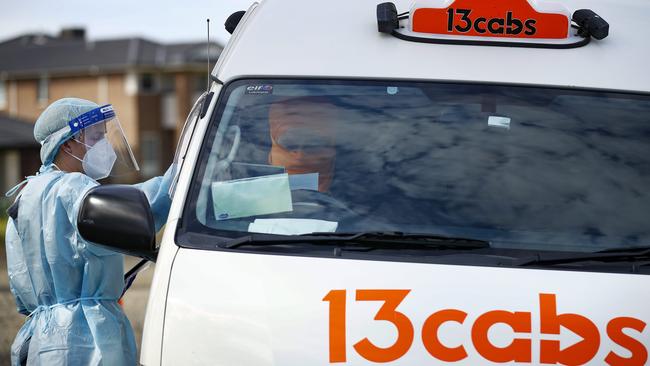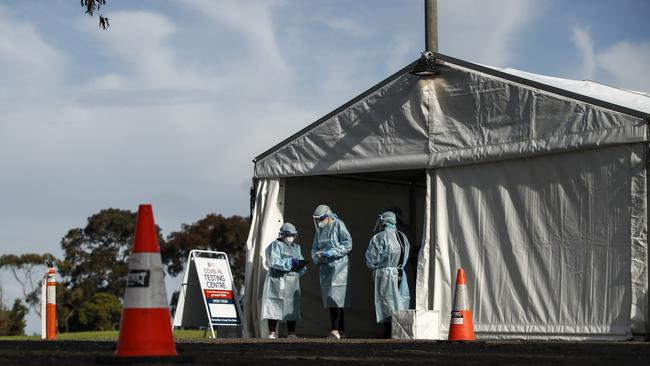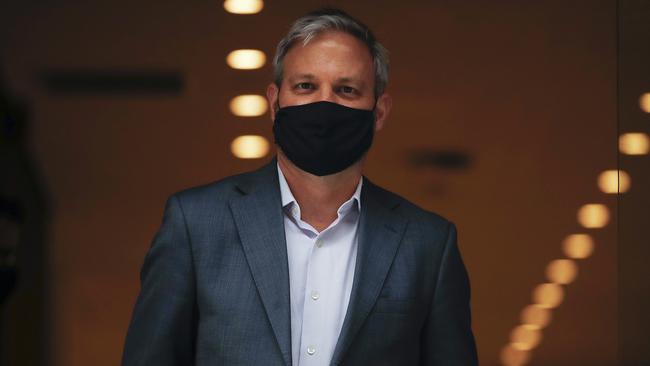Coronavirus: five infected families fuel new cluster
Members of five Melbourne households who visited each other’s homes are at the root of a fresh coronavirus outbreak.

Members of five Melbourne households who visited each other’s homes in potential breach of the city’s lockdown rules are at the root of a fresh coronavirus outbreak that has threatened the state’s bid to defeat its second wave.
Thirty-four people who live in Melbourne’s southeast have tested positive for COVID-19, with two understood to be undergoing treatment in hospital. Transmission occurred through household mingling, it emerged on Friday.
Health authorities revealed that they were forced to involve Victoria Police in a “painstaking” contact-tracing process, which proved challenging as links between the cases were not immediately obvious. None of those involved has been fined.
Premier Daniel Andrews described the outbreak, which Victoria’s Chief Health Officer Brett Sutton had linked to the Afghan community, as “disappointing”.
“Visiting other people’s homes is the real issue here, frankly,” Mr Andrews said. “The rules are in place for a reason. Anyone who undermines those rules, undermines the whole strategy.
The cluster, which covers households in Hallam, Clyde, Narre Warren South and Cranbourne North, is among 90 active cases in the municipalities of Casey and Dandenong, where health authorities have rolled out four new testing sites in a bid to bring the outbreak under control.
Active cases numbers across Victoria, however, have continued to fall. There were 45 new cases and five deaths reported on Friday, taking the state’s death toll to 750. Although Friday’s new cases were up on Thursday’s 28, the state’s 14-day rolling average and number of mystery cases are trending downwards.

Department of Health and Human Services deputy secretary Jeroen Weimar said tracking the cluster, for which the original source was still not known, had been a “significant and painstaking” process.
Mr Weimar said an incident response team had been set up comprising a range of health agencies and Victoria Police, who “were able to build a very clear picture of the contact between these five households and the nature of penetration into the wider surrounding area”.
He said the investigation had found members of the five households travelled close to home for essential purposes, such as to the Fountain Gate Shopping Centre to shop, but also outside the permitted 5km radius from their homes. “So these five houses in this particular cluster have had unfortunately some members of those households visiting other households,” he said.
“And it is that limited amount of contact, relatively infrequent contact between these five households, that has now meant we have 34 people in five houses exposed to or living with a very real threat of the coronavirus.”
Deputy Chief Health Officer Allen Cheng would not comment on why the individuals had visited each others’ homes but said they “understand why they need to be in isolation now”, so there was “no ongoing risk from them’’.
Afghan Australian Association of Victoria president Abdul Khaliq Fazal said police presence in the southeast was strong, with patrol cars “driving up and down the streets” where community members lived.
“That in itself seems to show that ‘if you go out, we will question you and we will fine you’,” Mr Fazal said. “Some people are feeling targeted.”

He said he was disappointed that the community, which was “largely law-abiding”, had been singled out by the government.
Mr Fazal said he knew individuals who had contracted the virus but it was not a result of them having breached the lockdown rules.
“In fact they are at home, they are not going out at all,” he said.
“There are legitimate reasons (for visiting others), such as checking on an elderly parent, who they might put to bed and then go straight home. It is children helping parents.”
The Premier declined to comment on the links to the Afghan community, only saying the virus did not discriminate between ethnicities or postcodes.
Defending the decision to not fine the individuals, he said no amount of money would equate to the value of a person providing contact tracers with timely information on where they had travelled and who they had come in contact with. “Tell us the full story and tell us quick,” he said.
A Victoria Police spokeswoman said patrols were part of the force’s role in supporting compliance with the Chief Health Officer’s directions to stop the virus spreading but it did not guard, homes, streets or neighbourhoods.
“Victoria Police receives daily details from DHHS of people who have tested positive to coronavirus or are deemed a close contact,” she said. “This information is then used by Operation Sentinel to conduct follow-up spot checks via a combination of doorknocks and geolocated phone calls.”
DHHS would not comment on specific measures taken to ensure members of the five households complied with the quarantine directions, citing privacy concerns. But a spokeswoman said: “Extensive contact tracing has been undertaken to contain this cluster and there have been very few close contacts outside the households.”
Mr Andrews said the outbreak had been complex but had been managed “very well”. “We have a high degree of confidence we have contained this,” he said. “We’ve got regional Victoria opening up; people should be optimistic this strategy is working … let’s not any of us do anything that might undermine this.’’



To join the conversation, please log in. Don't have an account? Register
Join the conversation, you are commenting as Logout